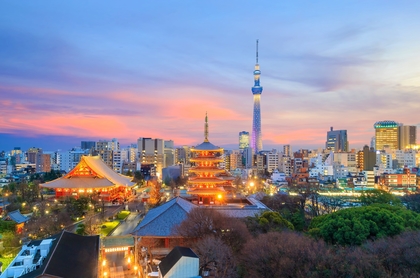Japan
Оновлено:
7 вер. 2020

Відвідати тут
Japan (日本, Nippon or Nihon ) is an island country in East Asia. It is bordered by the Sea of Japan to the west and the Pacific Ocean to the east, and spans more than along the coast of the continent from the Sea of Okhotsk in the north to the East China Sea and Philippine Sea in the south. Part of the Pacific Ring of Fire, Japan encompasses a stratovolcanic archipelago of about 6,852 islands, with five main islands (Hokkaido, Honshu, Kyushu, Shikoku, and Okinawa) comprising 97% of the country's total area of . Japan is officially divided into 47 prefectures and traditionally into eight regions. Approximately two-thirds of the country's terrain is mountainous and heavily forested, and less than one-eighth of land is suitable for agriculture. Consequently, Japan is among the most densely populated and urbanized countries in the world, with over 90% of its population living in urban areas. The largest of these is the metropolitan area centered on the capital city of Tokyo, which is the most populous in the world and home to more than 38 million people. Japan itself is the world's eleventh most populous country with a population of 126.2 million, of which 97.8% are ethnically Japanese. The kanji (or "Chinese characters") that make up the name of Japan in the Japanese language mean "sun origin"; in the Western world, the country is often known by the sobriquet "Land of the Rising Sun". Periods of influence from other regions, primarily China, followed by periods of isolation, particularly from Western Europe, have characterized the history of Japan. While archaeological evidence indicates that Japan was inhabited as early as the Upper Paleolithic period, the first written mention of the archipelago appears in Chinese texts from the first century AD. Between the fourth and ninth centuries, the kingdoms of Japan became gradually unified under an Emperor and imperial court based in Heian-kyō (modern Kyoto). However, beginning in the twelfth century, de facto political power came to be held by a succession of military dictators (shōgun) and feudal lords (daimyō) and enforced by a class of warrior nobility known as samurai. After a century-long period of civil war, Japan was reunified in 1603 under the rule of the Tokugawa shogunate, which established a government in Edo (modern Tokyo) and enacted a policy of isolationism. This period ended in 1853 when a United States fleet forced Japan to open to the West, leading to the fall of the shogunate and the restoration of imperial power in 1868. In the following Meiji era, Japan adopted a Western-style government and pursued a program of industrialization and modernization; this transformed the feudal society into a great power, with Japan establishing a colonial empire in East Asia after decisive victories in the First Sino-Japanese War and Russo-Japanese War. In 1937, the Empire of Japan invaded China, beginning the Second Sino-Japanese War; in 1940, it joined the Axis powers of World War II. After suffering major defeats in the Pacific and two atomic bombings, Japan surrendered to the Allies in 1945, coming under military occupation and adopting a new post-war constitution. Japan has since maintained a unitary parliamentary constitutional monarchy with the Emperor as a ceremonial head of state and an elected legislature known as the National Diet. Today, Japan is a member of numerous international institutions, including the United Nations, the OECD, the G7, and the G20. Although it has officially renounced its right to declare war, Japan maintains a modern military for peacekeeping and self-defense, which has been ranked as the world's fourth most powerful. Following World War II, Japan experienced record economic growth, recovering from the war to become the world's second-largest economy by 1980. Today, Japan's economy is the world's third-largest by nominal GDP and fourth-largest by purchasing power parity; it is also the fourth-largest importer and exporter and a global leader in the automotive and electronics industries. Japan is ranked "very high" on the Human Development Index; its population enjoys high levels of education and the second-highest life expectancy in the world, though it currently is experiencing a projected decline due to low birth rates. Culturally, Japan is globally renowned for its art, cuisine, literature, cinema, music, and popular culture, including its prominent comics, animation, and video game industries.